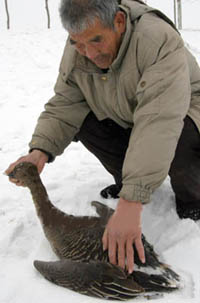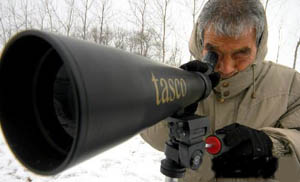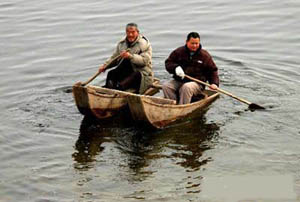| Tools: Save | Print | " target="_blank" class="style1">E-mail | Most Read |
| Bird Protector Guards Wetland |
| Adjust font size: |
The 66-year-old has been working as a bird protector for 10 years, since his hometown was annexed to Yellow River Wetland Reserve in 1995. The reserve, covering an area of 37,000 acres, consists of main stream channels, ancient geological gorges, farmlands, woodlands, and lotus rhizome ponds. It has a wide water area and numerous hydrophytes water plants and aquatics, which makes it a heaven for migratory birds wintering in the area. Every morning after breakfast, Zhang goes on his tour of inspection by bicycle from Tiexie section to Xixiayuan area along the bank of the Yellow River. He keeps a working log, recording when, where, and how many birds he sees each time. Observing birds is a work loaded down with trivial details. Once it rains, the bicycle cannot work because of the muddy riverbank, and Zhang will have to patrol for about 31 kilometres on foot. He wears out several pairs of shoes every year, while his wage is barely 100 yuan (US$12) per month. Zhang said: "If we all deny the job because it is unprofitable, then who is going to protect the birds here?" To ensure the safety of birds in the wetland, Zhang has endured countless hardships, let alone the complaints. As the number of birds dwelling around the wetland increases, the birds would peck crops when they could not get enough food. The rapidity that birds pecked the plant was surprising they were capable of eating up a cornfield of 0.12 acre within an hour. Villagers were choked with silent fury as they could neither shoot the birds nor poison them because of animal conservation regulation, so they often vented their anger on Zhang. However, what bothered Zhang was not the constant gripes but spoiled crops. "If only the State could legislate for compensating the spoiled crops around the reserve," he said.
Before long, a great congregation of birds flew over. According to Zhang, it was wild geese that came back for a drink after dinner. Zhang set up a blackboard in front of his house, on which he publicized the importance of environmental protection and knowledge about how to protect birds. Because of his persistent efforts, people around the neighborhoods are increasingly conscious of bird protection. The local police have also strengthened measures to forbid poaching, which Zhang said is another reason for the increase of the bird population.
(China Daily March 20, 2006)
|
| Tools: Save | Print | " target="_blank" class="style1">E-mail | Most Read |
 |
| Related Stories |




